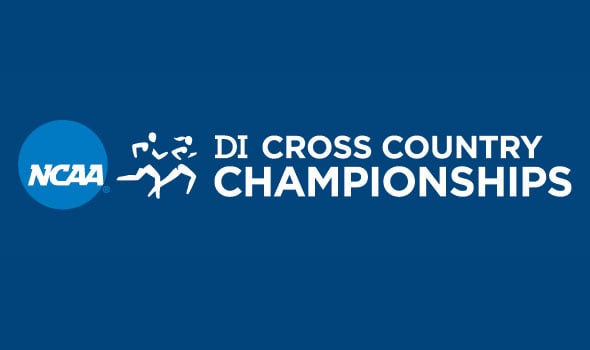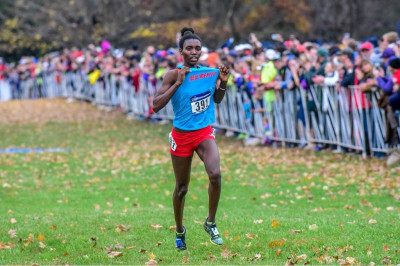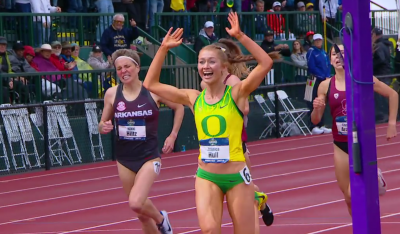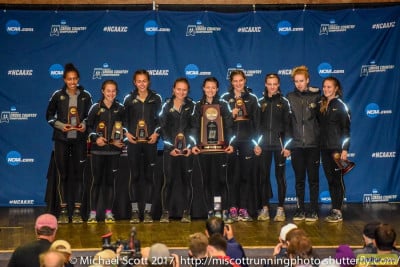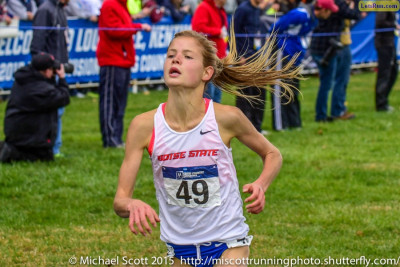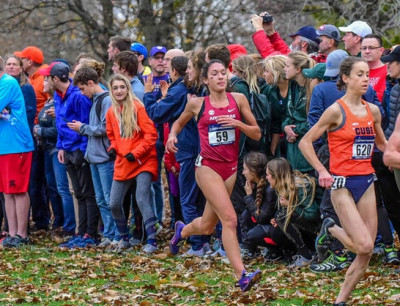2018 NCAA XC Women’s Team Preview: New Mexico Goes For 3rd Title In 4 Years Against A Deep Field Of Contenders
By LetsRun.com
November 14, 2018
“The NCAA [XC meet] is chaotic and unpredictable. Sometimes I like the chaos, but not always.”
So said the legendary Mark Wetmore earlier this week. And Wetmore should know as his Colorado teams have both caused and received their fair share of chaos during his 26 years in Boulder, during which he’s won five men’s and two women’s national titles. And if ever there was a year for chaos at the NCAA meet, it is 2018.
Joe Franklin, whose New Mexico team enters the meet ranked #1 in the country seeking a second straight title (and third in four years) told LetsRun.com he believes there are five schools capable of winning. But good luck figuring out in which order those order those schools will finish. Here is what has happened so far this season.
Colorado upset New Mexico to win the Nuttycombe Wisconsin Invitational on September 28, only to lose to Oregon at the Pac-12 champs on October 26. But Oregon lost to Arkansas at Pre-Nats on October 13 — which doesn’t make sense, because Arkansas was only 5th at the Nuttycombe Invite behind Colorado, Boise State, New Mexico, and Villanova. Boise State also beat New Mexico at Nuttycombe, but lost to the Lobos (by two points) at the Mountain West champs and lost to Oregon at the West Regional. New Mexico also gained revenge on Colorado by beating them at the Mountain Regional last week, but how much does that really matter when the only point of the meet is to qualify for nationals?
Got all that?
So yeah, expect a little chaos in Madison on Sunday.
With the 2018 NCAA Cross Country Championships just days away, we make the case for the five contenders, telling you why each of them will — and won’t — win. Let’s start with the reigning champs, and continue in descending order by the latest USTFCCCA coaches’ poll.
#1 New Mexico (3rd Nuttycombe, 1st Pre-Nats White, 1st Mountain West, 1st Mountain Regional)
Why they will win: Studs. New Mexico returns the individual champion in Ednah Kurgat as well as the likely 2018 individual champion in Weini Kelati, who won the White race at Pre-Nats and has been blowing away the competition ever since. While most of the teams on this list have someone capable of scoring in the low single digits, New Mexico has two — and they just might be the two best runners in the country. Charlotte Prouse is the country’s best #3 runner — she was 12th at NCAAs last year. So New Mexico clearly has the horses up front, and they’ve beaten two of their biggest rivals in recent weeks (Boise State at Mountain West, Colorado at regionals).
Why they won’t: There are some questions at the number five spot. Their #5 from NCAAs last year, Alondra Negron, is hurt and won’t run in Madison. And at the Nuttycombe meet in September, New Mexico’s #5 (Hannah Nuttall) killed them as she finished 83rd overall (no team in the top 7 in that meet had a worse #5).
The good news? The back end of New Mexico’s pack ran its best race of the year at regionals, as #5 Emily Martin took 15th and #6 Sophie Eckel took 16th — just a few spots behind #3 Prouse and #4 Adva Cohen in 11th and 12th. Martin and Eckel were still 13 seconds behind Prouse and Cohen, and there will be a lot more than two people between them if that gap remains the same at NCAAs. But if Martin or Eckel can even come close to the #5’s of the other contenders, New Mexico’s firepower up front should win the day.
History says that New Mexico will find that #5. Last year, Negron stepped up. In 2015, it was Molly Renfer who delivered a huge race at the #5 spot to finish 24th (yes, UNM’s #5 was 24th in 2015; she could have finished 124th and they still would have won). Franklin admits he was concerned after Nuttycombe this year, but he feels that his team is improving and that they’re in a very similar spot to a year ago.
“You’re always concerned, but then you have to just stick with the plan, stick to what you’ve done for 10 years,” Franklin says.
Franklin believes that it will take about 100 points to win this year (the average winning score over the last 10 years is 105). Assuming that Kurgat, Kelati, and Prouse score as many points as they did last year (16 total), that gives Cohen and UNM’s #5 an 84-point cushion. If Cohen finishes around 40th (roughly 30 team points), either Martin or Eckel has to finish in the top 75 to break 100 points. That seems doable: Martin was 86th last year, and Franklin says that she and Eckel were under control and talking to each other during the regional race. But if they falter, that leaves the door open for…
#2 Oregon (2nd Pre-Nats Cardinal, 1st Pac-12, 1st West Regional)
Why they will win: Balance. Oregon is just plain solid across the board. Their #1 Jessica Hull isn’t on the Kurgat/Kelati level, but she won Pre-Nats, has killer speed (NCAA 1500 champion), and should finish in the top 10 on Saturday (although we probably should point out she was only 93rd last year). Weronika Pyzik, who would be a #1 runner for any other team besides New Mexico, is a great #2 with championship experience (5th last year). Juco transfer Susan Ejore, who ran the 800 leg on Oregon’s winning NCAA DMR team earlier this year, is a bit of a wild card. She ran only one XC race last year and was 61st at Pre-Nats but improved to 6th at Pac-12s and 3rd at regionals so her upside is tremendous. Oregon’s #4, Carmela Cardama Baez, is credentialed. A 15:55/33:24 performer on the track she stepped up big last year and earned All-American honors b finishing 34th after finishing just 23rd at Pacs 12s. This year, she was 8th at Pac 12s.
And the Ducks are very solid at #5, #6, and #7 — had they scored their #6 and #7 instead of their #4 and #5 at Pac-12s, they still would have beaten Colorado, the #3 team in the country. Even in their lone loss this year, to Arkansas at Pre-Nats, Oregon had the best #5 runner in the field.
Why they won’t: Someone else goes low. There’s not much to dislike about Oregon, as we mentioned above. Looking at this team, it’s one that could definitely score in the 100-120 range, and if they run like they did at Pac-12s, where they threw down 32 points — the lowest score at that meet since Washington perfect-scored it 10 years ago — they will be extremely hard to beat in Madison. But the team with the best chance to go super-low in this race is New Mexico, with their trio of studs up front, and it could be that Oregon coach Helen Lehman-Winters sees a repeat of last year. Remember, in 2017 her San Francisco squad scored 105 — the average winning score over the past 10 years — but lost because New Mexico scored 90.
#3 Colorado (1st Nuttycombe, 2nd Pac-12, 2nd Mountain Regional)
Why they will win: Depth. Colorado’s recipe for victory at NCAAs is the same one they used to win the Nuttycombe meet on this course seven weeks ago. In that race, Colorado put four in the top 20 and six in the top 40 — they had six in before anyone else in the field had five. Colorado’s hope is that in a big field like NCAAs, they can wind up with five women in the top 50 and win with the best #4 and #5 runners in the field.
Why they won’t: Firepower. This Colorado team is very similar to the 2016 and 2017 squads. Both of them were built to win the same way — with depth — and that depth was on display at NCAAs.
In 2016, Colorado had the best #4 and #5 runners in the field.
In 2017, Colorado had the best #5 in the field and was 0.3 of a second away from having the best #4 (Makena Morley finished just behind San Francisco’s Marie Bouchard).
The problem? Both of those teams finished third.
It’s great to have a super deep team, but it’s even better to have a moderately deep team with studs up front. Eight of the previous 10 champions have had two women in the top 15. Check it out:
| Year | School | #1 runner | #2 runner |
| 2017 | New Mexico | 1st | 7th |
| 2016 | Oregon | 4th | 14th |
| 2015 | New Mexico | 4th | 5th |
| 2014 | Michigan State | 4th | 11th |
| 2013 | Providence | 7th | 27th |
| 2012 | Oregon | 3rd | 8th |
| 2011 | Georgetown | 4th | 50th |
| 2010 | Villanova | 1st | 10th |
| 2009 | Villanova | 6th | 13th |
| 2008 | Washington | 7th | 12th |
The two exceptions were 2011 and 2013, but those were years with extremely high winning scores. Georgetown scored 162 and won in 2011 (the second-highest winning score ever) and Providence scored 141 and won in 2013 (the fifth-highest winning score ever). But with so many strong teams this year, chances are at least one of them goes low. And history shows that it’s hard to get to 100 points without two low sticks.
Colorado has one low stick in Dani Jones. She was 10th last year and if she’s there with 100 meters to go, watch out, because that woman can fly. But Colorado’s #2 last year (Sage Hurta) was only 35th; the year before that, Colorado’s #2 was only 26th.
Has anything changed? Possibly. Makena Morley has the track credentials (15:40 5k pb) to be a top-15 finisher, and she showed it earlier this season by finishing 6th at Nuttycombe. But she moved back to 7th at Pac-12s. She’ll need to have a big race at NCAAs to give Colorado a second low stick.
One other thing: when we spoke to Mark Wetmore on Tuesday, he told us that “everybody” on his team was battling illness. At that point, we were still four days out from the meet, which means that CU’s runners have time to rest up. But it’s not a good sign in a race where a few points could be the difference between first and third.
#4 Boise State (2nd Nuttycombe, 2nd Mountain West, 2nd West Regional)
Why they will win: Balance. This Boise State team is constructed similarly to Oregon: they have a terrific #1 in Allie Ostrander, who has finished 2nd and 4th in two NCAA XC appearances. And in Emily Venters (15:49 5k, 9th Nuttycombe) and Clare O’Brien (15:42, 10th Nuttycombe), they have two other women capable of finishing in the top 30. But their depth is also excellent: they put six women in before New Mexico’s #5 at the conference meet, and while they lost to the Lobos by two points, that gap could prove crucial in a bigger field at NCAAs (although New Mexico’s super low sticks will certainly help as well). At Nuttycombe, Colorado was still better at the #4 (19th vs. 26th) and #5 spots (38th vs. 41st) — which is why the Buffs won — but Boise State kept it close enough that they could turn the tables at NCAAs.
Why they won’t: They haven’t won a major meet all season. Boise State beat Oregon and Washington to win the Sundodger Invitational on September 8. Since then, they’ve finished 2nd at Nuttycombe, 2nd at Mountain West, and 2nd at the West Regional. The phrase here may be “jack of all trades, master of none.” Their front three are strong, but not as strong as New Mexico’s. They have good depth, but perhaps not quite as good as Colorado’s. Boise State is good enough to win, but only if some others like New Mexico and Oreogn have an off day but none of their strengths are quite as strong as their rivals’ strengths.
#5 Arkansas (5th Nuttycombe, 1st Pre-Nats Cardinal, 1st SEC, 1st South Central Regional)
Why they will win: Their pack. Arkansas has a solid #1 in Kiwi freshman Katrina Robinson (2nd Pre-Nats), but she’s not on the same level as the other #1’s on these teams. But the Razorbacks make up for it with a very strong #2 through #4. Taylor Werner, Carina Viljoen, and Lauren Gregory went 6-8-10 in the White race at Pre-Nats, where Arkansas beat Oregon by 20 points, largely because Arkansas had four runners in before Oregon even had two. Their #2 through #4 spread was 6.8 seconds at Pre-Nats and 4.9 seconds at regionals, where Arkansas went 1-2-3-4 for 21 points — the lowest score by any women’s team at any regional since at least 2004 (the USTFCCCA archive is spotty before then, though the BYU women scored 20 in 1999). Of course that came at the weak South Central Regional, but it was still an impressive showing.
And don’t think the Razorbacks won’t be prepared for the weather. They excelled at Pre-Nats, where temps were in the 30s, and the day after regionals it was 22 degrees in Fayetteville as they did their long run. There were even some snow flurries in Arkansas earlier this week.
“We’ve talked about it since the beginning of the season — hey, you better get ready for it, because [the weather’s] not gonna change,” says Arkansas coach Lance Harter.
Why they won’t: Their #5 (and the lack of a big-time low stick). The drawback to having a strong top four is that when you’re weak at #5, it makes it stand out even more. Here are the gaps from Arkansas’ #4 to their #5 (Sydney Brown) at Pre-Nats, SECs, and regionals (we left out Nuttycombe because Arkansas hadn’t added Lauren Gregory yet):
Pre-Nats: 20.2 seconds
SECs: 21.6 seconds
Regionals: 33.3 seconds
That gap has to come down at NCAAs. As solid as Arkansas’ top four are, New Mexico is even better up front, which means that Arkansas will have to make up ground at #5 to beat them. And that could be tough but it could happen as Arkansas 5th and 6th aren’t exactly chopped liver – they both finished in the top 10 at SECs.
The other issue? Robinson and the Werner/Viljoen/Gregory combination may not be good enough up front to win the national title. As we noted above, usually it takes two women in the top 15 to win NCAAs. Robinson can probably do that (but isn’t a lock), but it would take a big race from one of Arkansas’ other runners to crack the top 15. In what could be a tight race, losing a few points at the top could prove fatal.
LRC prediction: It’s hard to look at New Mexico’s team this year and not think of the similarities to the 2017 edition that won NCAAs with 90 points. The star-studded top three remains the same, and while there’s a bit of a question mark at the #5 spot, the Lobos were in the same spot last year and got it done.
We asked Joe Franklin for the biggest difference between this year’s squad and the 2017 title team. His response:
“I don’t see much. The 5th is very similar, whoever that 5th is, to last year’s 5th. Ednah and Weini are running well, Charlotte is running well. Obviously we don’t have Alice [Wright, who finished 14th at NCAAs last year] in there, [but] Adva keeps getting better. I don’t see much difference in last year’s team versus this year’s team. Emily Martin last year at the NCAAs was one spot behind Alondra [Negron, UNM’s #5] at the NCAA championships.”
That settles it. New Mexico is our pick to repeat.
| [gravityform action=”polls” id=”738″ mode=”poll” cookie=”1 month” show_results_link=”false” display_results=”true” percentages=”true” counts=”false” ajax=”true”] |
Be a fan and talk about the women’s team battle on our world famous messageboard. No registration required.
